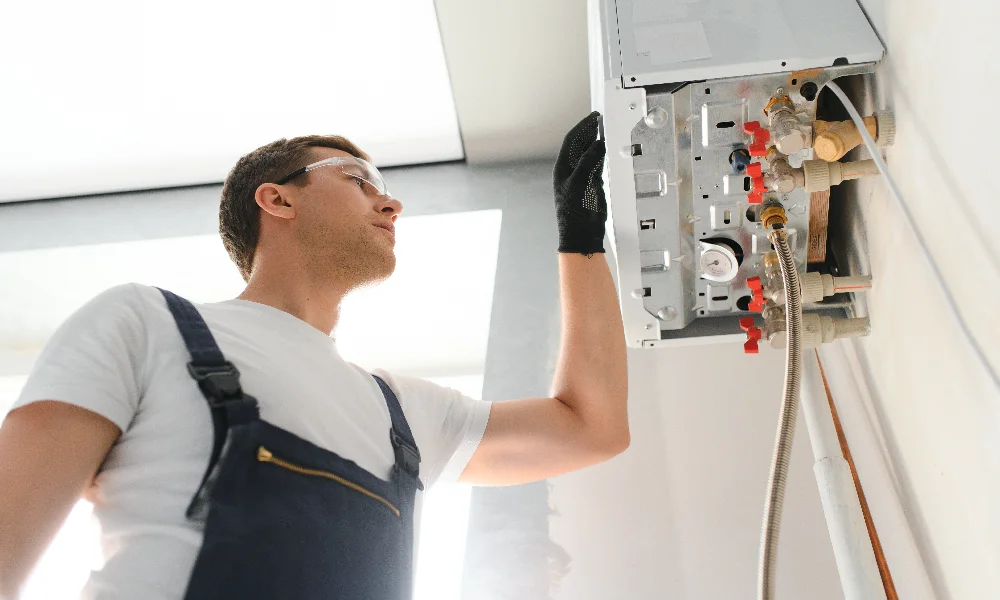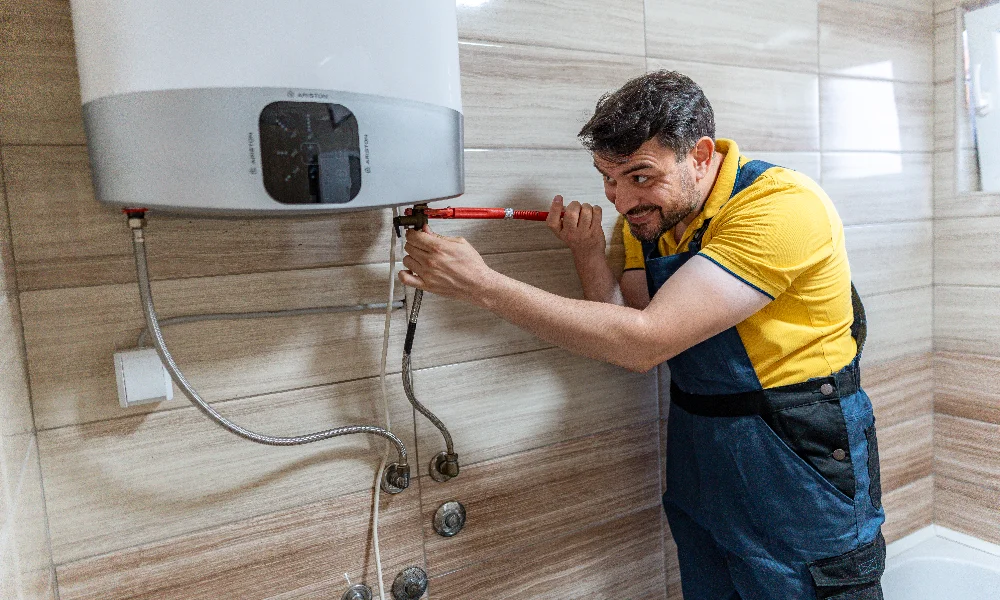
You wake up to weird noises coming from your utility room, such as snaps, bangs, and even hissing. It’s enough to make anyone uncomfortable. You might wonder, is a noisy water heater dangerous or just an annoying household quirk? While some sounds are harmless, others may pose a threat to your safety and that of your house. Understanding what these noises signify might help you take action before minor problems evolve into costly fixes — or worse, major risks.
Let’s look at why your water heater creates noise, when to worry, and what to do about it.
Should a Water Heater Make Noise?
Normal Operating Sounds
A water heater is not designed to be silent. It is typical to hear small clicks, delicate humming, and the subtle whoosh of gas ignition. These are typical signals that your heater is cycling on and off to keep the temperature stable. Electric machines may produce a mild hum, whilst gas ones frequently create a quiet roar when burning gas.
So, should water heater make noise at all? Yes, but only mild, consistent sounds that do not vary in tone or volume over time.
Abnormal or New Sounds
When your heater starts cracking, pounding, or hissing, you know something isn’t right. These noises could indicate silt buildup, excessive pressure, or even severe overheating. If you suddenly hear new or louder sounds, it is best to have the system evaluated before the problem worsens.
Is a Noisy Water Heater Dangerous?
Now for the burning question: Is a noisy water heater dangerous? Yes, in certain instances. While not all sounds indicate danger, some can indicate conditions that endanger your safety and the structural integrity of your home.
Risks Associated With Noisy Units
Explosion or Tank Rupture
A crackling or rumbling heater may indicate excessive sediment buildup. When heat is trapped behind the debris, pressure can build up inside the tank. In extreme circumstances, this might result in ruptures or explosions.
Fire and Carbon Monoxide Exposure
Abnormal roaring or sputtering sounds coming from gas heaters may indicate a problem with combustion. Poor ventilation or defective burners can cause carbon monoxide, a lethal gas that is both odorless and colorless.
Scalding and Overheating Hazards
Overheated water can quickly scald the skin. If you hear boiling or teakettle noises, your unit could be dangerously hot.
Gas Leak and Ignition Risk
A hissing sound can indicate that gas is escaping. If you smell gas, leave immediately and ask for help; do not attempt to fix it yourself.
Electrical Shock or Burn Risk
Electric heaters that buzz or crackle may have loose or failing components, posing a risk of shock or electrical fire.
Water Damage and Mold From Leaks
Persistent dripping or sizzling could indicate that water is leaking inside the unit. This can cause floor deterioration and mold growth over time, resulting in long-term health risks.
Warning Sounds That Signal Risk
Popping or Rumbling
This usually implies that silt has accumulated at the bottom of the tank. As water bubbles through the trash, it produces popping sounds, indicating that the tank is straining.
Sizzling or Hissing
This could indicate that water is spilling onto hot metal or gas components, which is a warning sign for both water and electrical safety.
Screeching or Whistling
These noises, which are frequently associated with restricted water flow or high pressure, can eventually destroy pipelines or tanks.
Banging or Hammering
This phenomenon, known as “water hammer,” occurs when water abruptly stops or changes direction. It is capable of rattling pipes and loosening fittings.
Boiling or Teakettle Noise
Boiling sounds indicate that the tank is overheating, a potentially hazardous situation that requires quick treatment.
Roaring or Unstable Flame
In gas heaters, an uneven or roaring flame can indicate combustion issues, potentially leading to carbon monoxide buildup or fire hazards.
Immediate Safety Steps to Avoid Accidents and Hazards
1. Turn Off Power/Fuel and Cold-Water Supply
If you suspect a threat, turn off the heater’s electricity or gas supply immediately. To cease feeding the tank, close the cold water valve.
2. Check T&P Valve Discharge and Visible Leaks
The temperature and pressure relief valves should safely discharge any excess pressure. If there is a leak or a blockage, turn everything off.
3. Ventilate and Leave if You Smell Gas
Don’t take chances; instead, open the windows, escape the area, as well as contact emergency services or your gas provider.
4. Call a Licensed Plumber
When in doubt, contact a skilled plumber to evaluate and repair the system safely.
Why Does My Water Heater Make Noise?
If you’re still wondering, why does my water heater make noise, here are the most common reasons.
Sediment Buildup and Superheating in the Tank
Minerals in hard water sink to the bottom of the tank, trapping heat. When water boils through the sediment, it produces popping and rumbling sounds.
Scale on Electric Heating Elements
Limescale can coat the heating element, causing it to work harder and emit hissing or sizzling sounds.
High Water Pressure, Thermal Expansion, and Water Hammer
Too much pressure inside pipes can generate banging noises, particularly when the heater turns off abruptly.
Loose Pipe Supports, Straps, or Mounts
If your pipes rattle or tremble, loose fittings could be the cause.
Failing Parts
Failing parts, such as valves, elements, or thermostats, may produce whining or humming sounds as they struggle to function properly.
Burner, Combustion, or Venting Problems
Improper fuel combustion can result in roaring or spitting noises, which is a major problem that must be addressed by a technician.
Tankless-Specific Causes
Tankless units may also emit clicking or buzzing noises as a result of scale buildup or insufficient gas flow.

How a Plumber Gets a Water Heater to Stop Making Noise
Flush and Descale the System
A plumber will drain the tank and then flush the silt. This simple approach frequently eliminates most popping as well as rumbling.
Stabilize Pressure and Flow
They can build expansion tanks or modify pressure regulators to maintain the flow consistent and silent.
Repair or Replace Worn Components
Old heating elements, valves, and thermostats can be replaced to ensure safe and silent operation.
Fix Combustion and Venting Issues
Technicians evaluate gas units’ burners and vents to ensure appropriate airflow and eliminate hazardous gases.
Contact Wally Blanton For Water Heater Repairs in Antioch, IL
A noisy heater may appear harmless, but you now understand the dangers it might pose. Do not overlook the warning indications, whether they are a little pop or a frightening hiss. Understanding is a noisy water heater dangerous helps you act fast, prevent damage, and keep your family safe.
If you’ve been asking yourself why does my water heater make noise or should water heater make noise, it’s time to get answers from the experts.
At Wally Blanton Plumbing & Sewer Service, our licensed plumbers in Antioch, IL, are trained to diagnose, water heater repair, as well as maintain all types of water heaters — quickly and safely. Don’t wait for the problem to grow louder.
